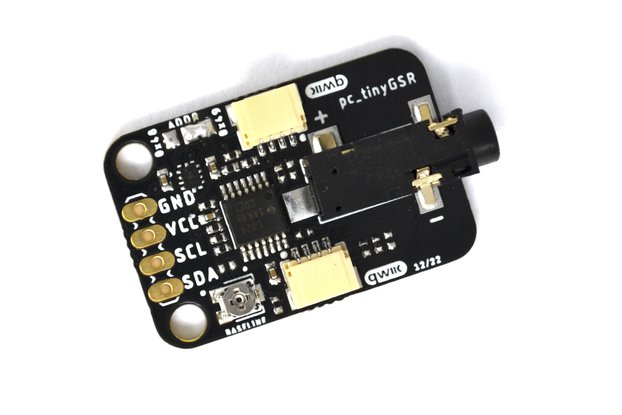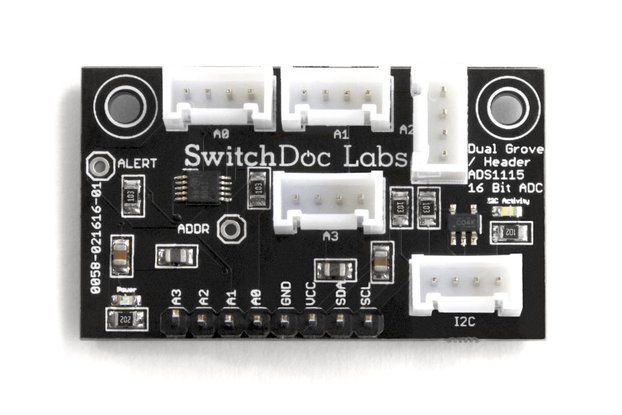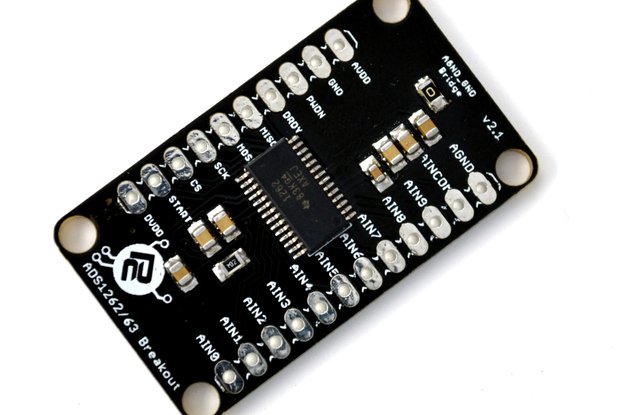This is a simple 4-channel, 24-bit, STEMMAQT compatable I2C analog-to-digital converter (ADC) ADS122C04
Designed by Anapos Sensing and Design in United States of AmericaThis seller is taking a break. Sign up below to get an email when they're back!
No shipping info available.
Set destination country to see options
Shipping to starts at
Free shipping is available to !
Ships from
This item does not ship to .
More Info
Sign up and we'll send a reminder when the seller returns!
24 bit Analog-to-digital Stemma QT Why did we make it? If you have low-level analog signals in the microvolt to millivolt range, a 12-bit or 16-bit analog to digital convertor probably won't cut it. …
Read More…If you have low-level analog signals in the microvolt to millivolt range, a 12-bit or 16-bit analog to digital convertor probably won't cut it. You may be able to find other precision analog-to-digital boards out there, but they probably use the SPI interface that will gobble up 3 to 4 precious digital I/O pins. To overcome these limitations, we created the ADS122C04 breakout board which includes a 24-bit analog-to-digital convertor and is Adafruit STEMMA QT and I2C compatible!
This is a simple STEMMA QT compatible board that includes the Texas Instruments ADS122C04, a 4-channel 24-bit, analog-to-digital converter (ADC) based on the popular ADS1220 but with an easy to use and pin saving I2C interface.
The chip can perform conversions at data rates up to 2000 samples-per-second (SPS) with single-cycle settling. At 20 SPS, the digital filter offers simultaneous 50-Hz and 60-Hz rejection for noisy industrial applications. The internal PGA offers gains up to 128. This PGA makes the ADS122C04 ideally suited for applications measuring small sensor signals, such as resistance temperature detectors (RTDs), thermocouples, thermistors, and resistive bridge sensors.
The board conforms to the Adafruit STEMMA QT specification making it an ideal option for adding high-precision analog sensing to your Stemma QT-based microcontroller projects. There's two Adafruit STEMMA QT compatible connectors (J1,J2) so you can easily daisy-chain it into any existing STEMMA QT ecosystem.
We included an on-board 3.3V TC2185 ultra low-noise LDO regulator and 5V to 3.3V level shifter for easily interfacing with both 3V or 5V based microcontrollers.
The ADS122C04 is a precision, 24-bit, analog-to-digital converter (ADC) that offers many integrated features for measuring small sensor signals. The device features two differential or four single-ended inputs through a flexible input multiplexer (MUX), a low-noise, programmable gain amplifier (PGA), two programmable excitation current sources, a voltage reference, an oscillator, and a precision temperature sensor.
The device can perform conversions at data rates up to 2000 samples-per-second (SPS) with single-cycle settling. At 20 SPS, the digital filter offers simultaneous 50-Hz and 60-Hz rejection for noisy industrial applications. The internal PGA offers gains up to 128. This PGA makes the ADS122C04 ideally suited for applications measuring small sensor signals, such as resistance temperature detectors (RTDs), thermocouples, thermistors, and resistive bridge sensors.
The ADS122C04 features a 2-wire, I2C-compatible interface that supports I2C bus speeds up to 1 Mbps. A 16-pin TSSOP package and is specified over a temperature range of –40°C to +125°C.
VCC (6V max), 3.3V out (100 mA max), power ground, 4 analog signal inputs and 2 signal ground are provided on the 3.5 mm screw terminal (J1).
I2C pullups: 4.7K pullups are provided on both 3V and 5V SCL and SDA signal lines.
I2C Addresses: Solder Jumpers (JP1,JP2) are provided to configure the board to one of 4 different I2C addresses. Address pins A0 and A1 are grounded by default configuration providing an I2C address of 0x40.
| Address | A0 | A1 | JP1 | JP2 |
|---|---|---|---|---|
| 0x40 (default) | G | G | Open | Close 1-2 |
| 0x41 | 3.3V | G | Close 1,2 | Open |
| 0x42 | SDA | G | Open | Close 2-3 |
| 0x43 | SCL | G | Close 2-3 | Open |
3.5-6 V input.
3.3V input or output (100mA max).
I2C Data in/out.
I2C Clock input.
Even though the ADS122C04 comes with a low drift precision 2.048V reference, REFP and REFN are broken out to J1 to provide an external voltage reference for ultra-precise and low-drift applications.
(SDA)
Monitor the ADC's conversion register by tying an interrupt to the active low Data ready (DRDY ) pin. DRDY is an open-drain output pin that indicates when a new conversion result is ready for retrieval. When DRDY falls low, new conversion data are ready.DRDY transitions back high when the conversion result is latched for output transmission.In case a conversion result in continuous conversion mode is not read, DRDY releases high.
Reset the ADC by taking the RST pin low and then returning the pin high.After the rising edge of the RST pin, a delay time is required before communicating with the device;see the ADS122C04 I2C Timing Requirements section for reset timing information.
No country selected, please select your country to see shipping options.
No rates are available for shipping to .
Enter your email address if you'd like to be notified when Stemma QT ADS1220 I2C 4 ch 24 bit ADC can be shipped to you:
Thanks! We'll let you know when the seller adds shipping rates for your country.
| Shipping Rate | Tracked | Ships From | First Item | Additional Items |
|---|---|---|---|---|
|
:
|
No shipping info available.
Set destination country to see options
Shipping to starts at
Free shipping is available to !
Ships from
This item does not ship to .
More Info
Sign up and we'll send a reminder when the seller returns!

$19.95
Free Shipping!

$19.95
Free Shipping!

$39.95
Free Shipping!

$15.00
Free Shipping!
By clicking Register, you confirm that you accept our Terms & Conditions
We recognize our top users by making them a Tindarian. Tindarians have access to secret & unreleased features.
We look for the most active & best members of the Tindie community, and invite them to join. There isn't a selection process or form to fill out. The only way to become a Tindarian is by being a nice & active member of the Tindie community!
